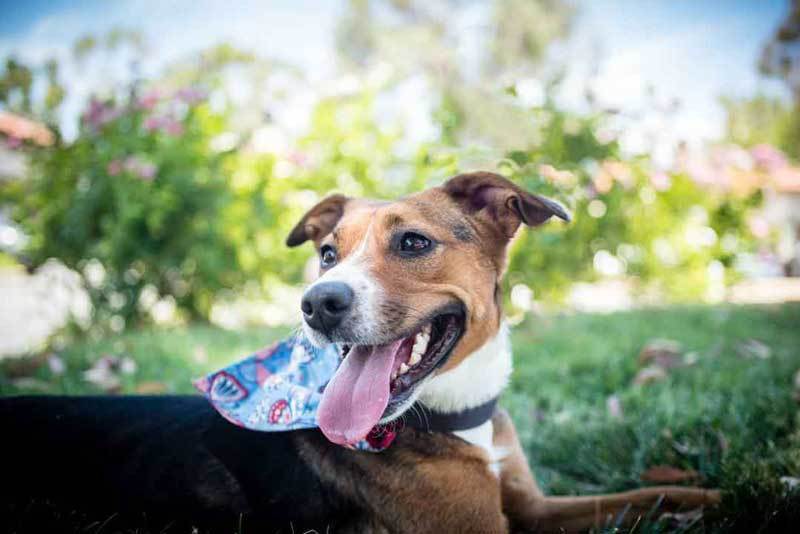
It can be very scary when your dog loses interest in food or stops eating altogether. We want to do the best for our pets and protect them but it is not always easy to understand what is going on with them. There are many reasons that dogs may not eat and we want to help you identify some possible causes so that you can figure out the solution. Sometimes it is as simple as, they just don’t like food, so if you have introduced a new food, that could be the culprit. The other question to consider is whether this is a new or ongoing issue. If they have always been disinterested in food, it could be just your dog’s unique appetite fluctuations. If it is unusual or sudden, the following ideas may help narrow down the cause.
Reasons that your dog may not eat:
- Feeling poorly: When humans get sick or have stomach issues they may not be interested in food, and dogs are the same! As any pet parent knows, dogs will happily eat some unpleasant things off the ground, and sometimes these items can make them feel badly. If they are vomiting and can’t hold down water, then call your veterinarian immediately as that can be an indication of something serious, such as a blockage or an infection. Many pet parents are familiar with losing socks or mittens because their dog ingests them and that can require immediate surgical removal. If they just feel a little off, and are still drinking water and are not vomiting or exhibiting signs of distress, they may resume eating relatively quickly. If you notice that your dog is losing weight, or not drinking water, or drinking excessive amounts of water, or vomiting combined with not eating, make sure to reach out to your vet immediately to determine the best course of action.
- Motion : If your dog stops eating after traveling it could be due to an unsettled stomach after the car or plane ride. Most dogs love the car but some are sensitive to motion. You can open the window, or if you have a small dog you can get a seat that raises them high enough to look out the window or to get some fresh air. Puppies can experience motion sensitivity and grow out of it but not all do. If you are traveling, new or foreign surroundings can stress out your dog leading them to temporarily lose interest in food. Try to calm them by taking them on a walk and keeping to your normal routine so that they understand and get comfortable in the new surroundings. Usually if a dog begins to feel calm and has a routine, they will return to a regular eating schedule.
- Dental Issues: Tooth or gum discomfort may make your dog not want to eat. Dogs usually suffer from plaque buildup but can also have severe tooth decay and this could cause them to refuse to eat. Small dogs are particularly prone to bad teeth and may require tooth extraction. Bad breath is a sign of serious dental issues which in turn can lead to other serious health concerns. To try and prevent dental issues, there are a few different ways to clean your dog’s teeth including: brushing them, dental treats, dog chews, bones, or encouraging them to chew sticks. If the problem seems serious you can also reach out to your vet for a dental exam and if needed get their teeth professionally cleaned and discuss extraction. To help your dog get enough nutrition, try wetting the food with broth so that it is softer and easier for them to eat or mixing with some canned food or canned pumpkin.
- Picky Eater: Dogs have preferences for food, so they may not be eating because they don’t like the taste of their current food or just get tired of one type of food You can try enhancing their food with chicken or vegetable broth and by trying a different brand and gradually introducing the new food. Some dogs may prefer wet food to dry food because they don’t like the texture. Be patient with your picky pup while you’re trying to find the right food but watch out for feeding your dog human food or too many treats to get them to eat. One method favored by veterinarians is to put the food bowl down and if they haven’t eaten it in 15 minutes, take it away. If you are consistent with this, they should be ready to eat at meal time!
- Stress from Separation: If somebody close to the dog has left the house or if the person who normally feeds the dog is not there at mealtime it can cause disinterest in food. Dogs are very routine oriented and a new person or a new feeding schedule can cause temporary unease. When leaving the house, try providing them a long-lasting bone to chew on or leave a food puzzle for them so that they don’t get bored and distressed. Taking your dog for a walk or other kinds of exercise helps tremendously in keeping them happy and relaxed, which promotes a healthy appetite.
As always, if your dog doesn’t resume eating or just seems off to you, please check in with your veterinarian. While some appetite fluctuations are normal, some can be a sign of more serious issues. Feel free to reach out to the ElleVet team to see if any of our CBD+CBDA products can help your dog with their situational stress or occasional inappetence. The ElleVet team is also well versed in overall dog wellness, so don’t be afraid to reach out with any questions. We want to keep your dog happy, healthy, and eating!









